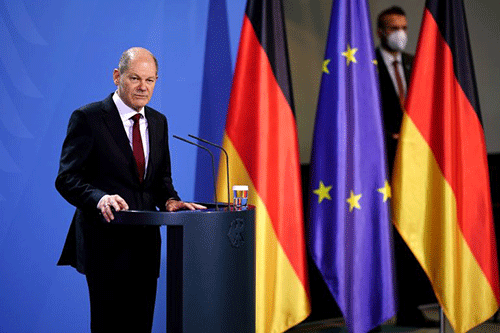German chancellor Olaf Scholz said his country wants to help mineral-rich countries build their processing infrastructure to cut dependency on China and source it straight from countries like Namibia, Indonesia and Chile.
“At the moment, we import raw materials from China, which is despite the fact that rare earth copper or nickel are often not even extracted from the earth there but rather from countries like Indonesia, Chile or Namibia – from countries that often do not profit nearly enough from the richness of their natural materials. We want to change this,” stated Scholz while opening
Germany’s industrial trade fair in Hannover Messe last week.
According to International news agency Reuters, Berlin is trying to rebalance its relationship with China and reduce reliance on Asia’s powerhouse for key inputs, such as nickel and other critical minerals.
Scholz added if Germany succeeds in locating more processing steps
where the raw materials are in the ground, then that will not only create greater local prosperity but also ensure they have more than just one supplier in the future.
Lithium-rich African countries like Namibia are trying to develop
processing and refining industries to capture more of the profits of global demand for battery material.
As the auto industry shifts towards electric vehicles (EVs) – spurred by proposed bans on fossil-fuel cars beginning at the end of the decade – lithium prices and demand have soared.
China, the world’s top lithium refiner and a leading producer dominate
the supply chain, but Western governments and international companies are trying to challenge that, and see Africa’s lithium reserves as an opportunity.
In February, Namibia’s mines
minister Tom Alweendo told Reuters
in an interview at the Investing in
African Mining Indaba in Cape Town: “We are going to insist that all lithium mined within the country has to be processed in the country”.
Africa’s lithium production is set to rapidly increase this decade. From
40 000 tonnes this year, the continent will likely produce 497 000 tonnes in
2030, commodities trader Trafigura estimates.
Lithium prices more than doubled
last year, as demand from the electric vehicle industry outstripped supply.
According to the Namibia Statistics Agency (NSA), in its Trade Statistics Bulletin February 2023, the monthly change went up by 3.8% in exports of goods, which was mainly reflected in copper blisters that increased by N$675 million.
Additionally, copper blisters took the fifth position with a share of 8.7% of total exports and were destined for Belgium and the Netherlands.
It went on that copper blisters, fish and precious stones (diamonds) were destined for the Economic Co-operation and Development (OECD) as well as European Union region.
Additionally, the German government has already agreed to invest in Namibia’s green hydrogen sector through scholarships and pilot projects.
Last year, Germany’s green hydrogen envoy Rainer Baake said his country is keen on supporting Namibia’s ambitions of achieving large-scale, low-cost renewable energy development and designing models for sustainably maximising fiscal revenue.
This, he said, would boost local development in renewable energy investments and green ammonia production.
According to Baake at the time, Namibia can expect a stable market for its new green products in Europe, mainly because the EU has set emission reduction targets that their various industries have to meet.
–mndjavera@nepc.com.na


